The best businesses meet customer needs. As a platform that provides free insights and analysis on top search queries, Google Trends can be an invaluable tool in your retail toolbox for discovering products that actually meet those needs—but only if you know how to get the most out of it.
This guide walks through how to use Google Trends to find trending products along with advice on how to make sense of the data you uncover.
What is Google Trends?
Google Trends is a free tool that shows how often people are searching for specific terms on Google, making it easier to see what's currently popular.
As the world's leading search engine, Google handles over two trillion search queries annually. Its advanced algorithm effectively makes sense of the search data you and your customers are looking for, making it one of the best places to find near real-time market research on shopping trends.
How can Google Trends help you find trending products?
Analyzing search patterns allows you to discover trending products and understand what products are gaining attention worldwide, regardless of the region or language. Insights like these are crucial if you want to find popular products on Google Trends to start or expand your business.
Google Trends also helps you:
- Discover product search volume. If you start selling a product that nobody's interested in, you'll be fighting a downhill battle. Check Google Trends product data before settling on your idea to confirm there's demand.
- Check seasonal demand. Seasonal businesses aren't bad, but if they're your only source of income, you might want to supplement them with other evergreen products.
- Nail down your customer’s lingo. Google Trends allows you to compare different search trends to find the vocabulary your target audience uses. This is invaluable for marketing and advertising campaigns.
Google Trends products: 8 items to sell online in 2024
What are the trending products to sell? These eight items show promise with plenty of search volume for 2024.
1. Laser hair removal products
The number of people searching for "laser hair removal" has remained stable on Google Trends over the past five years, making it a viable product category to build a long-term business.
Trending products to sell and capitalize on in this niche include:
- At-home laser hair removal machines
- Laser hair removal services
- Laser hair removal kits with aftercare products like exfoliators or moisturizers
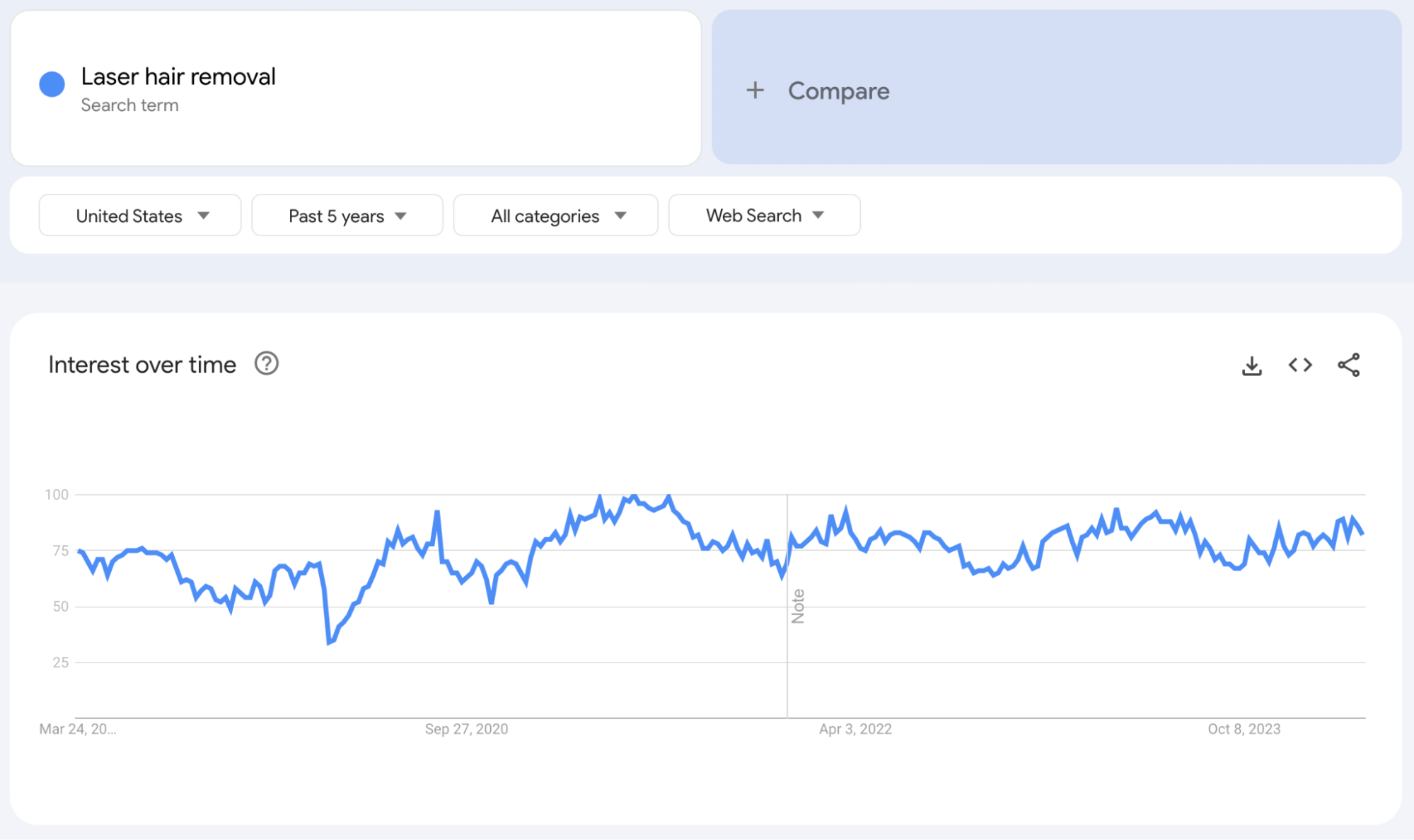
2. Tinted SPF
Tinted SPF has been gaining traction over the years, with Google Trends data indicating a steady increase in interest. This surge highlights a growing consumer preference for skincare products that offer both protection and a hint of color.
With Google Trends' Related Queries section, you can uncover specific niches within the tinted SPF market, including:
- Tinted mineral SPF
- Tinted moisturizer SPF
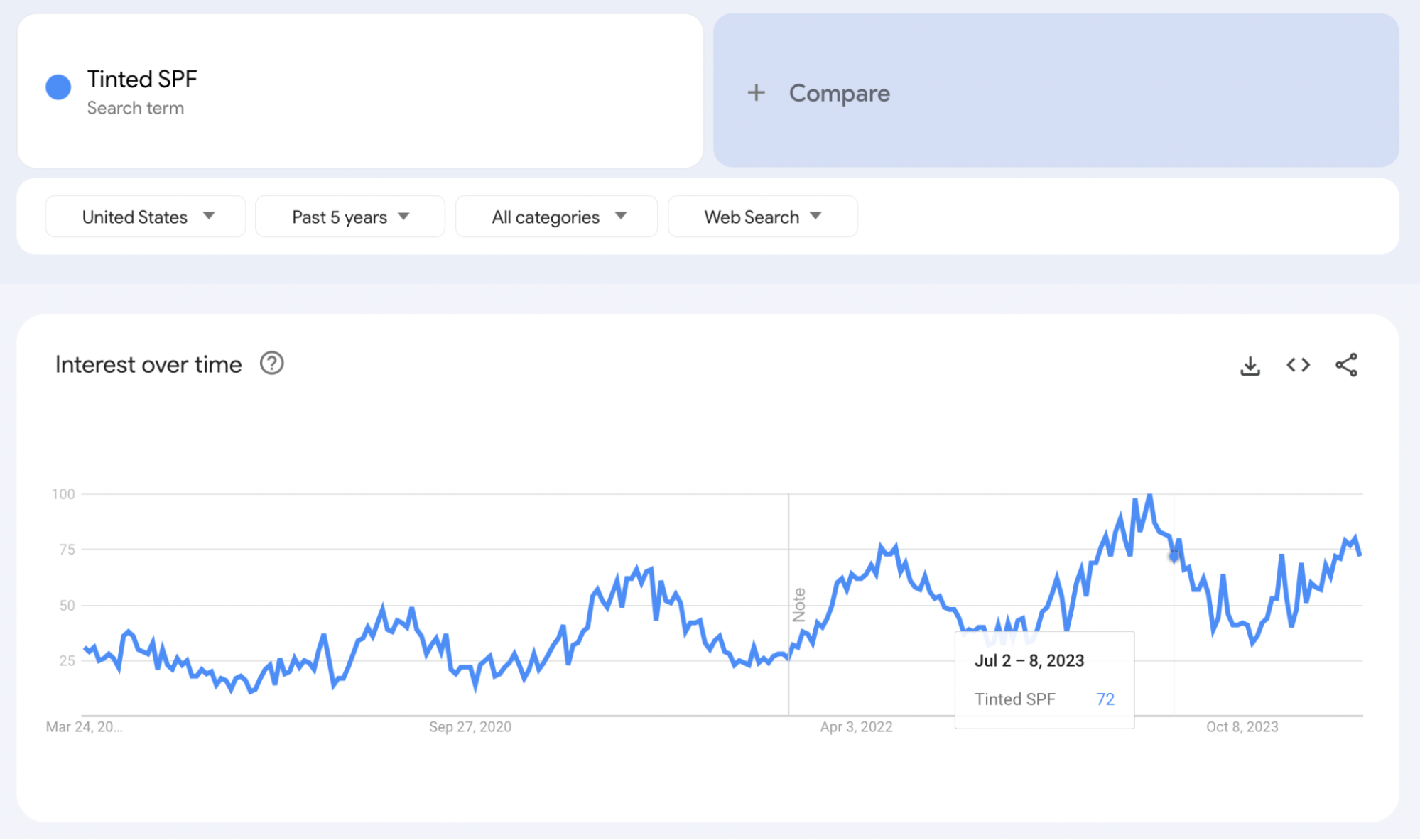
3. Detangling hair brushes
"Detangling hair brush" doesn't have search volume, but that's not to say people aren't looking for the item. Tangle Teezer is one brand dominating this industry, with thousands of people searching for the brand name each year.
Capitalize on this opportunity by:
- Building a brand around a hair detangling product
- Using Google Ads to appear in the sponsored search results for “Tangle Teezer”
- Comparing your brushes’ features against the Tangle Teezer
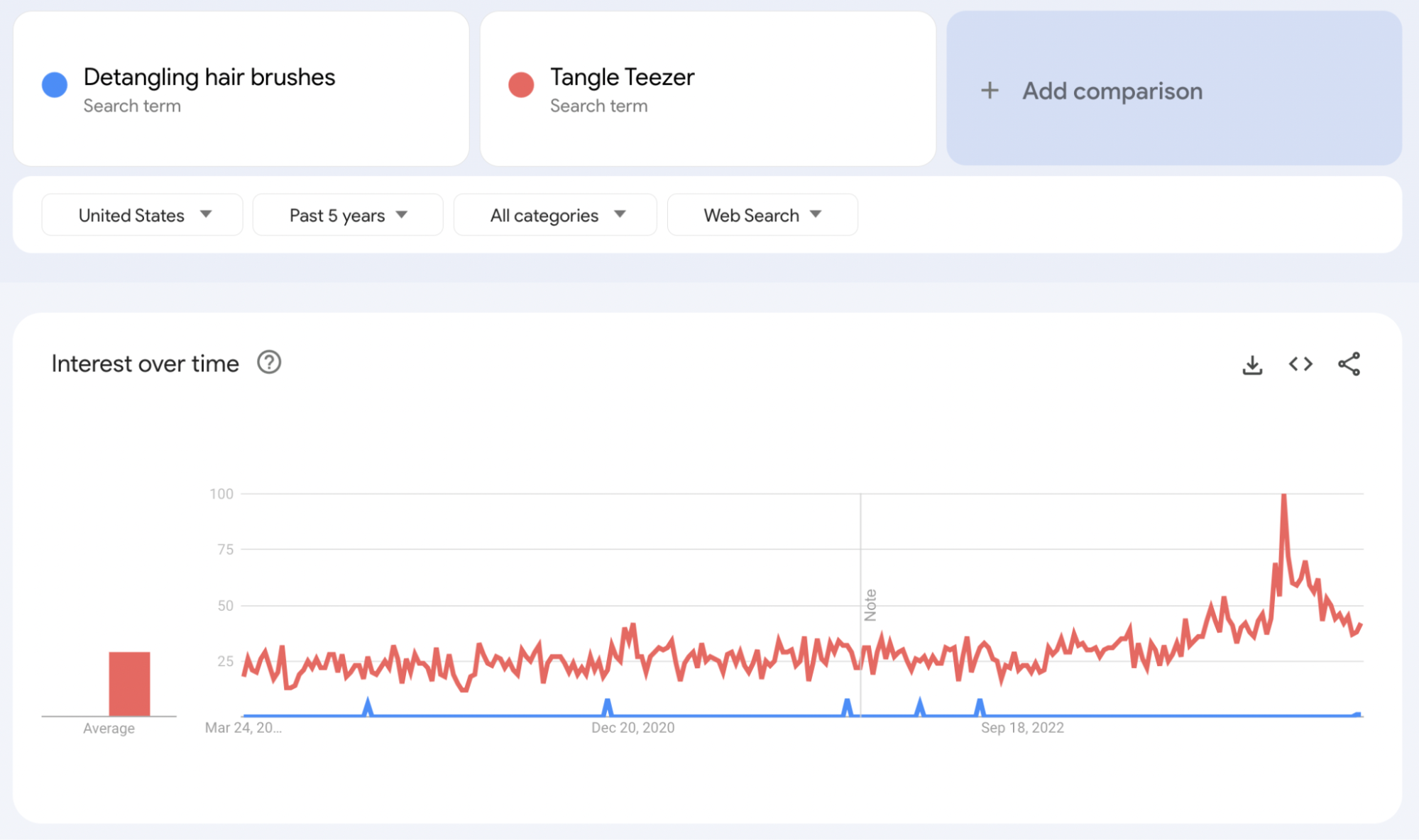
4. Athleisure
Athleisure is a relatively new concept that picked up momentum in 2016. The word combines" athletic" and "leisure" to describe wearing gym clothes regularly.
Capitalize on the athleisure trend by selling the following products through your online store:
- Workout clothes
- Sneakers
- Sweatpants
- Athleisure workwear
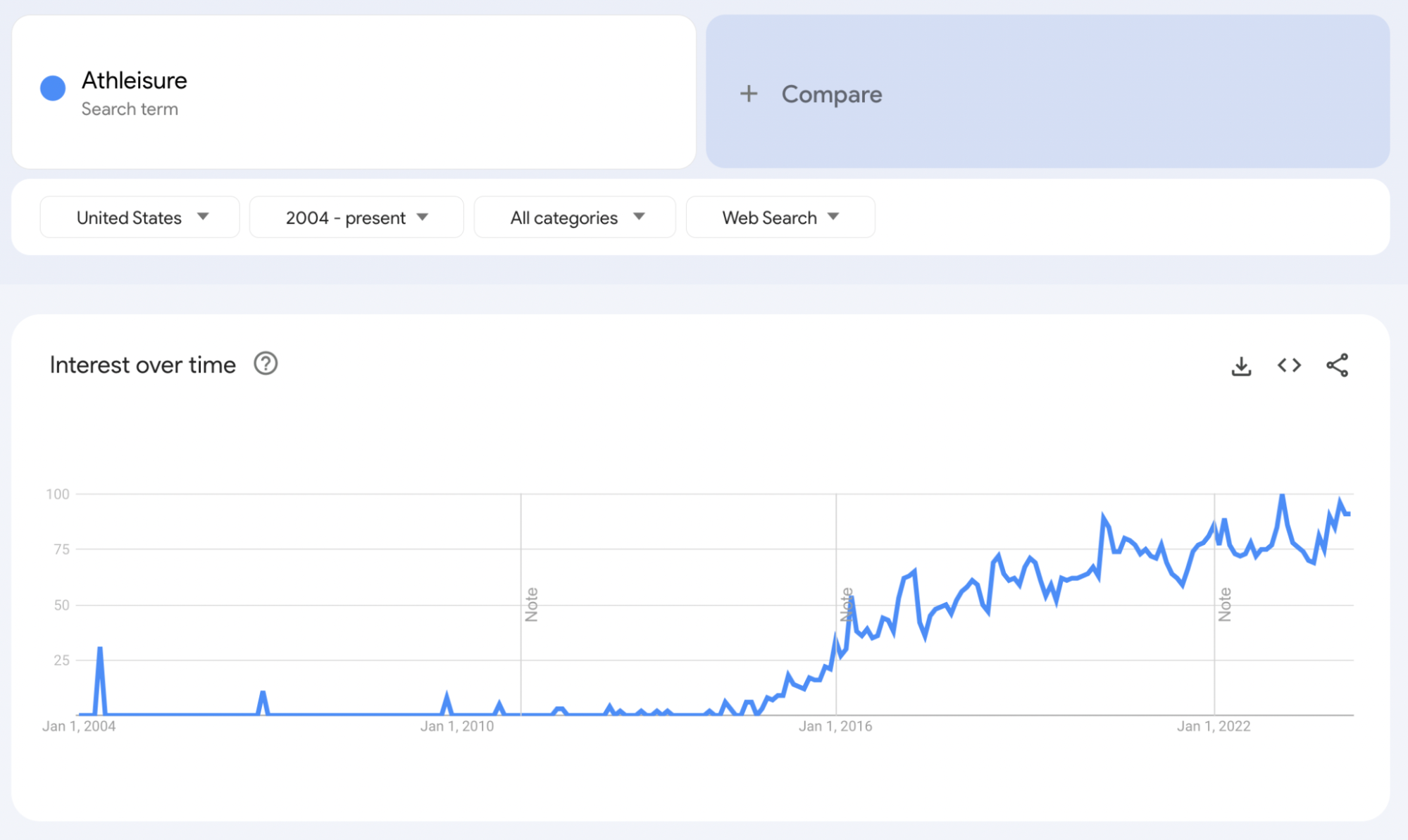
5. Indoor plants
If you look at search interest for the term “indoor plants” since 2004, it’s a huge trend that took off around 2016. However, zoom in to a five-year timeframe and you’ll see a fluctuation in search demand.
This likely means two things: Indoor plants are on a long-term growth trajectory that will continue. Also, it’s a very seasonal item, which is important to keep in mind if you want to remain profitable year-round.
Some of the cities with the most searches include:
- Oakland
- Frisco
- Richmond
- Long Beach
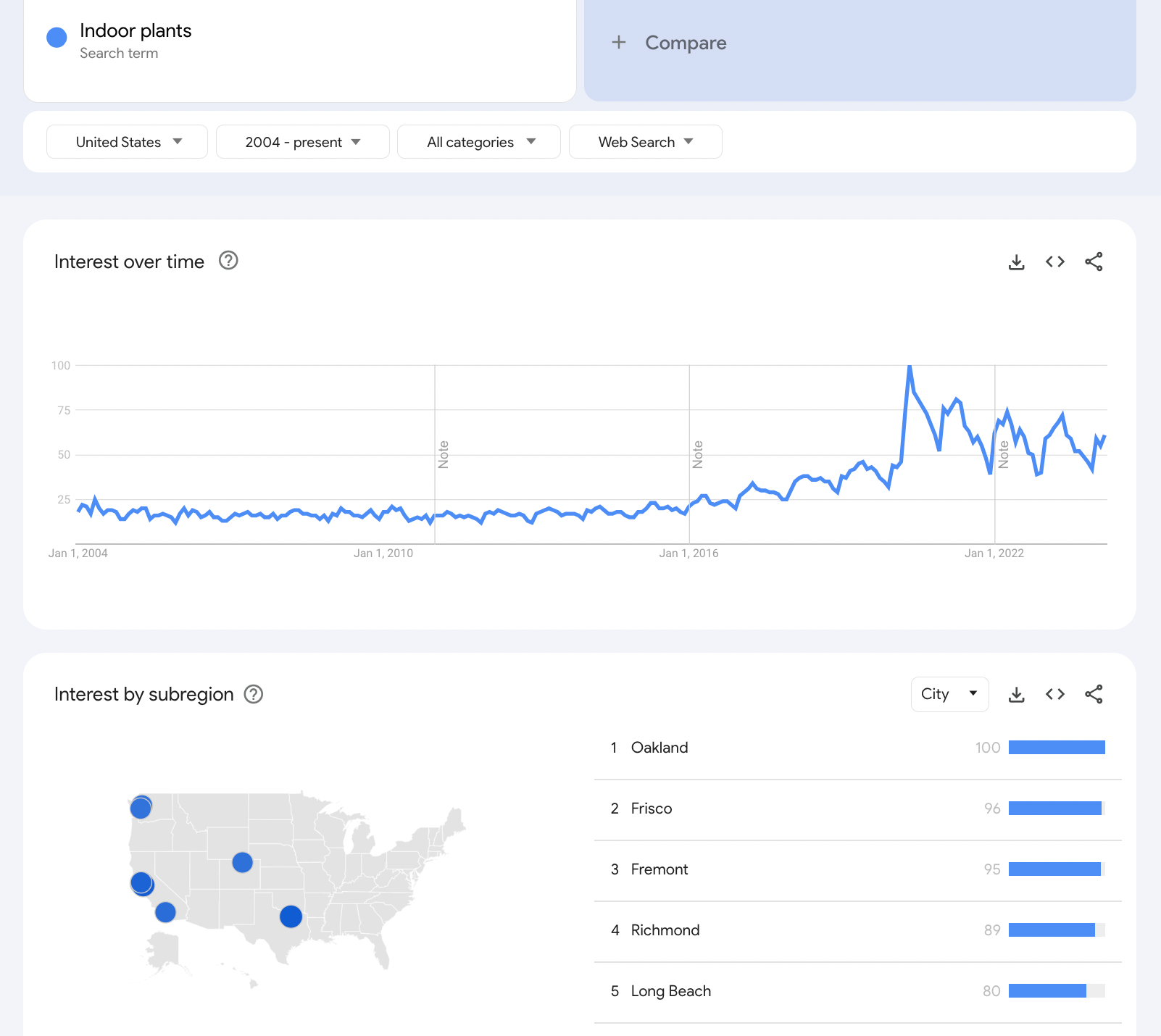
6. Anti-snoring products
Studies suggest that 57% of men and 40% of women snore. Google Trends suggests that this is a frustration for many bed-sharers.
Searches for anti-snoring products are consistent, including:
- Devices
- Pillows
- Mouthpieces
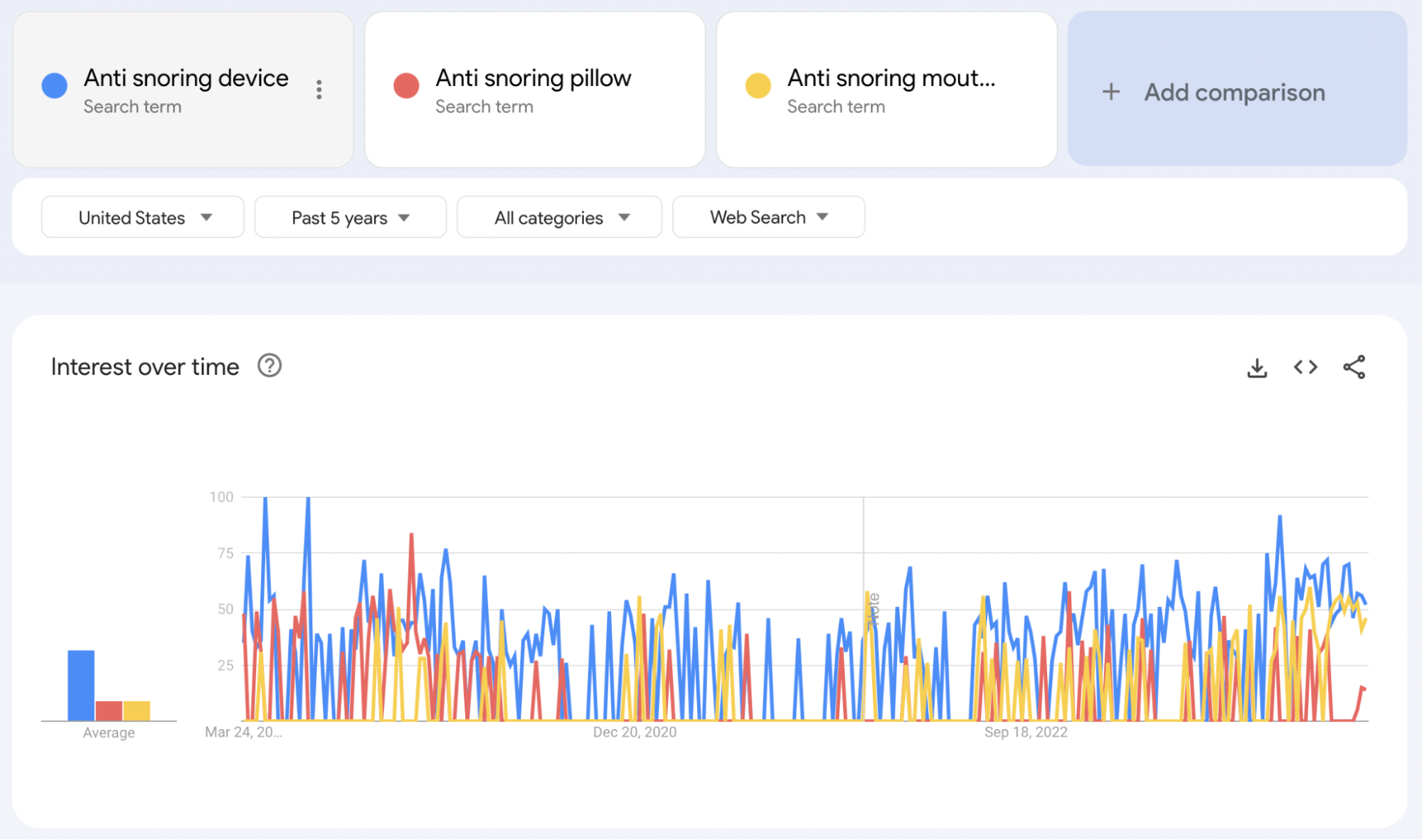
7. Silk bonnets
Silk bonnets have steadily risen in popularity over the past five years—thanks in part to how trendy they’ve become on TikTok as a reliable way to keep hair healthy, less frizzy, and less tangled.
If you want to sell variations of a standard silk bonnet, check out a few of the top related search queries on Google Trends:
- Silk bonnet for curly hair
- Satin bonnet
- Black bonnet
- Sleeping bonnet
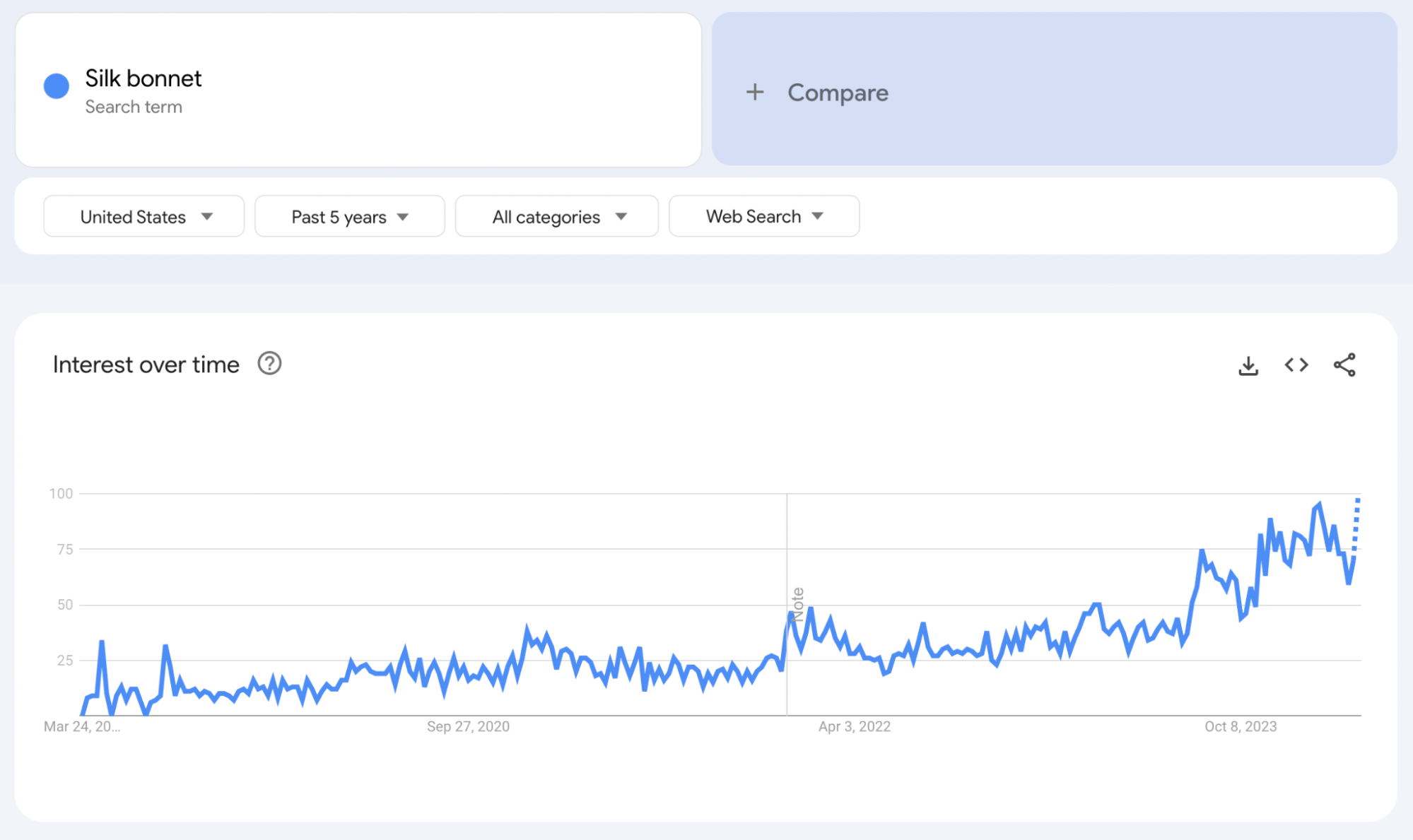
8. Supplements
A broader search for the category "supplements" also shows a slow but steady upward trend over five years. However, a closer look into related queries and you can get more specific about the types of supplements people want and are searching for most, including:
- Magnesium supplements
- Collagen supplements
- Hair supplements
- Dog supplements
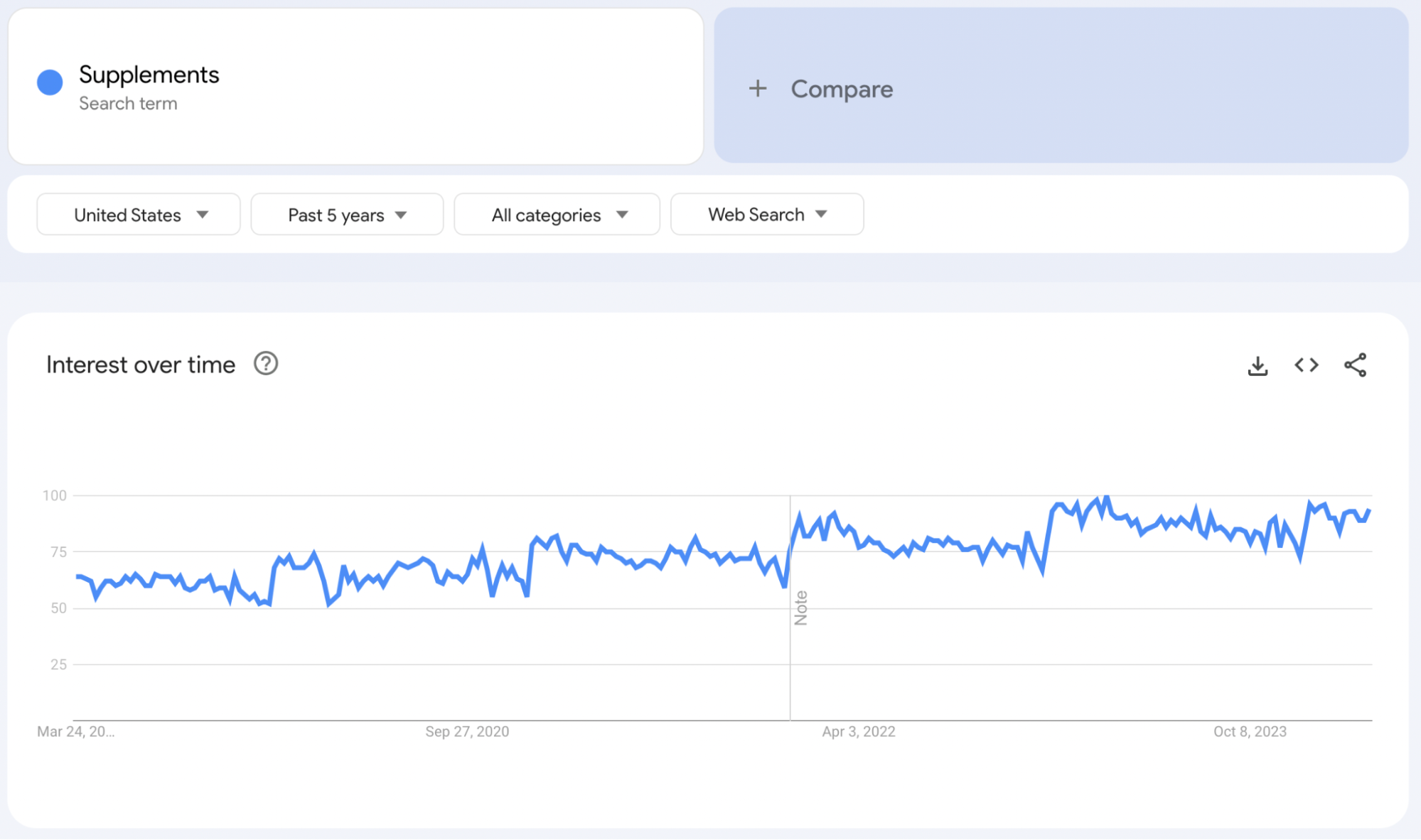
How to use Google Trends to find products
Head to the Google Trends homepage and type the keyword or phrase you want to find search data for. You'll see a graph showing the search trend for that term, alongside localized data and related queries that'll help you understand the following steps.
1. Use Google Trends data to find niches
Before you launch your retail business—or before you launch a new product, service, or branch of your brand—it never hurts to use Google Trends to validate your ideas.
Start with a clear goal. Are you jumping on a trend, breaking new ground in an industry, or selling unique, custom products? Working backward from an end goal will make the decision-making process much easier as you sift through possible product ideas.
2. Look for relevant product categories in related topics
Google Trends isn’t just a goldmine for identifying popular products. Retailers can use its data to expand product lines and categorize inventory.
Beauty retailers searching for “moisturizer” see “rising” topics like CeraVe, Neutrogena, night, and sunscreen—four potential avenues to explore an already-popular product line. They could:
- Stock CeraVe or Neutrogena products
- Create a visual merchandising display of nighttime skin care products
- Highlight a moisturizer’s SPF contents in product packaging
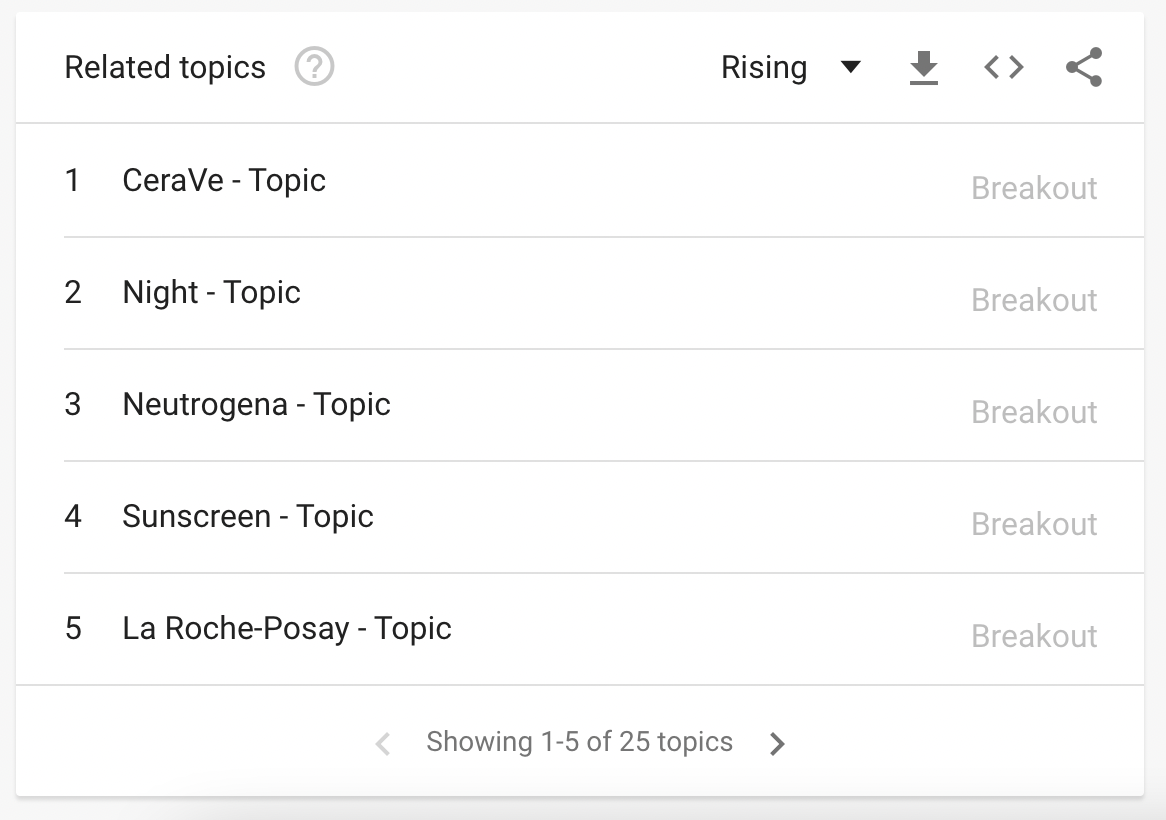
3. Identify seasonal trends to promote relevant products
Not all products are popular year-round. The most obvious examples are Christmas-related products. People generally don't buy Santa-themed decorations in June, and high demand for holiday products peaks in the later months of the year.
Products that might not seem seasonal often have cyclical purchase patterns. Google Trends shows searches for “lunchbox,” for example, peak in August—just before the start of a new school year.
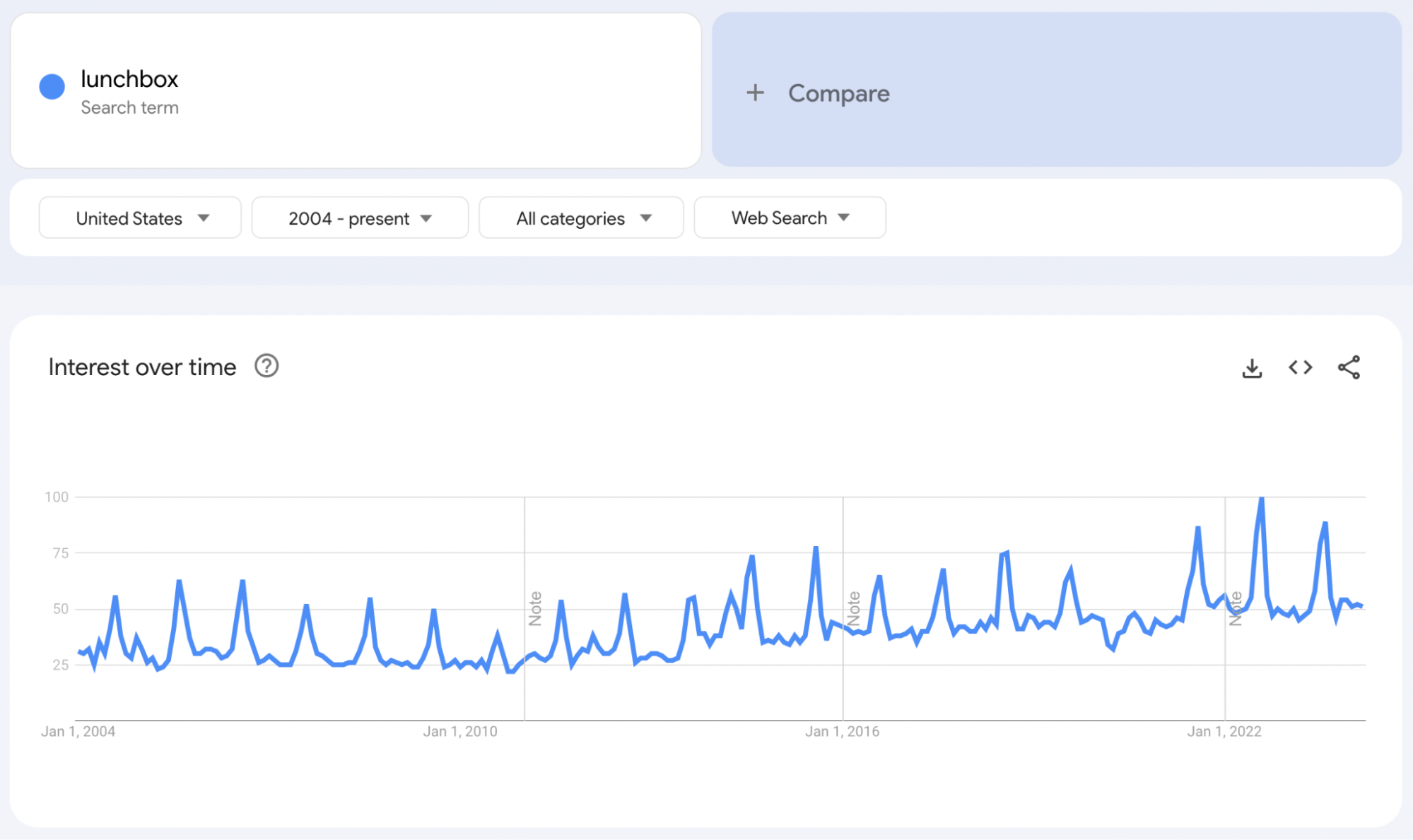
To analyze seasons products on Google Trends:
- Year-over-year analysis: Compare search interest in your product during the same months across different years to identify consistent seasonal trends.
- Look for patterns: Notice if search interest peaks around certain events, weather patterns, or some national holidays over others. This may indicate the best times to ramp up your marketing efforts.
- Analyze broader seasonal category trends: Look at the overall trends within your product's broader category during different times of the year to gauge whether interest in the category is rising or waning. This broader perspective can help you distinguish between product-specific seasonal trends and general market movements for better marketing campaigns.
4. Consider your customers’ feedback in making a decision
Customer feedback, combined with Google Trends data, is always a great starting point for launching a business, new product, or service that’s actually in demand.
Design open-ended questions that prompt your ideal customers to learn about their pain points and moments of struggle. With powerful tools for advanced search query research like Semrush or Ahrefs, you can even dive deeper into long tail keywords for users trying to find answers to hyper-specific challenges related to your product idea for further validation.
What to look for on Google Trends
You’ve identified seasonal trends and product ideas, and validated your research. But what should you look for when evaluating Google Trends data? Here are six of the most important signals.
Search trends over time
Pay attention to how often people are looking for products you offer. A rise in searches for "eco-friendly water bottles" likely means more people want a product that’s ecologically conscious to sustain a healthy habit. In turn, it may be a product worth selling.
How to track product search trends:
- Start with broad terms: Enter a broad product category into Google Trends, such as "water bottles," before narrowing it down to "eco-friendly water bottles." Starting broad helps you understand the market landscape, giving you a better chance of seizing opportunities and making informed decisions.
- Check related queries: Scroll down to the Related Queries section to discover specific related terms people are also searching for. This might reveal niche trends.
- Adjust the time frame: Experiment with different time frames to detect both short-term spikes and long-term trends that may be seasonal.
Noticing a dip in searches for certain products, like "fidget spinners," alerts you to fading trends. This is your cue to rethink your strategy and clear out inventory that's not moving.
Compare specific phrases
Google Trends can help you get your product messaging just right, whether you use outbound or inbound marketing techniques. Compare different phrases and keywords within the tool for added context.
Let’s say you’re in the financial advice industry. There are no regulations around terms like “financial planner,” “financial advisor,” or “financial adviser.” How do you know what title resonates best with consumers you want to reach?
Compare the phrases in Google Trends to see what people actually look for over time. Start with one of the phrases that you want to consider using, like “financial advisor.”
Hit the “Compare” button to start making sense of what direction to take with your messaging.
“Financial advisor” is the most searched term of the three options, which helps you make a data-backed decision when you’re considering customer messaging.
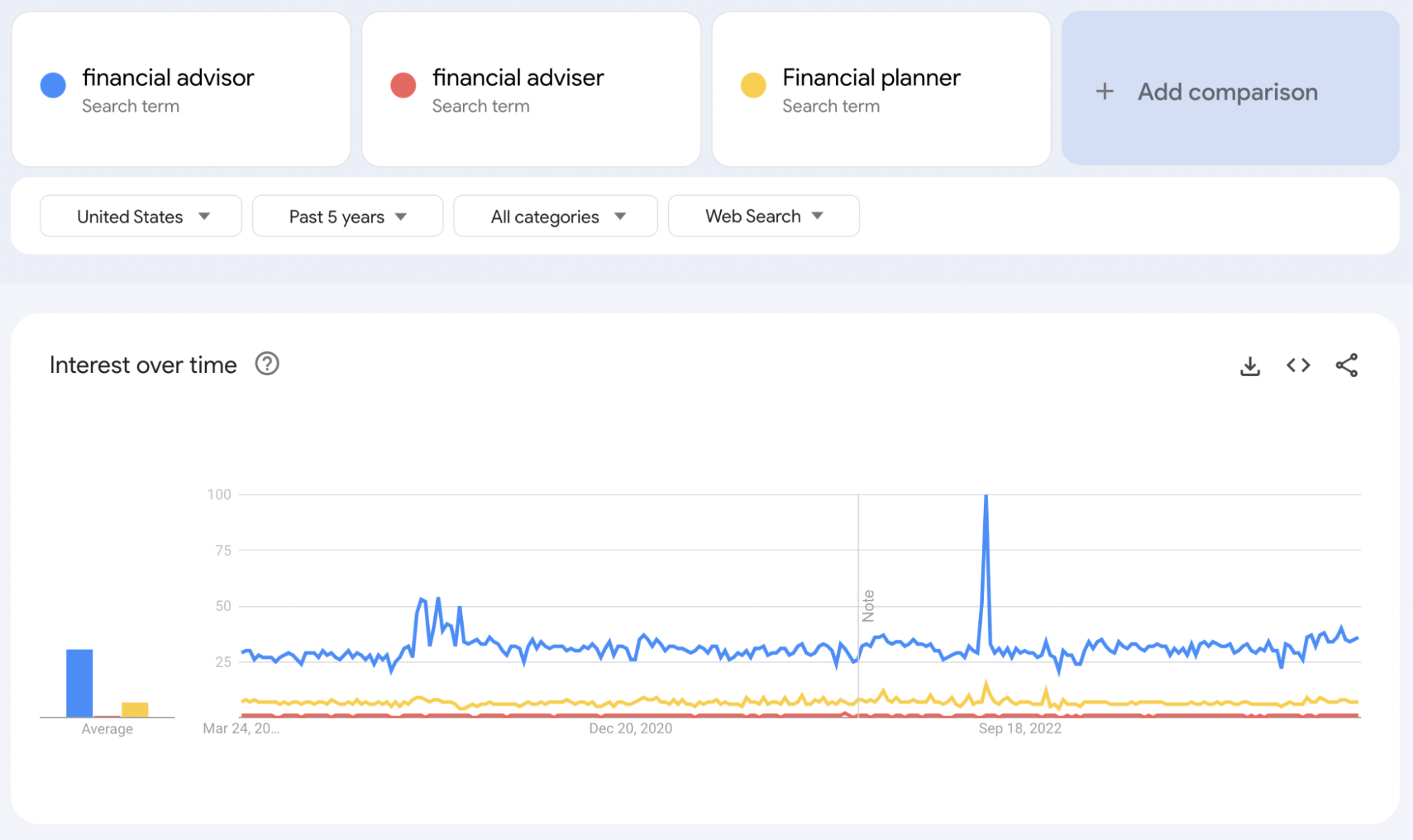
Here’s how to get familiar with your customer’s language with Google Trends:
- Keyword variations: Start by searching variations of your product description, like "sustainable fashion" and "eco-friendly clothes," to see which terms are more popular.
- Geographic insights: Use the location filter to understand how language preferences might differ by region, ensuring that your search numbers are as accurate as possible.
- Trending searches: Look through the "Trending searches" section to stay up to date with the most current terms being used. Sometimes, a currently trending subject can spark an idea for a related product search term.
Evaluate searches by location
Knowing which regions search most for your product—like "artisan coffee" being a hit in cities—helps you focus your marketing spend where it counts. Understanding these regional preferences helps you get your products in front of markets where demand is highest.
To gauge regional product demand:
- Filter by subregion: Use the Subregion dropdown menu below the trend graph to select different regions within that country. Doing this updates the data to show more specifically where your product is being searched for the most, helping you pinpoint market interest geographically.
- Get city-level insights: Explore the city-level data available in the same dropdown menu. It’s a closer look at urban areas with the highest interest. A “self tanner” search filtered by city immediately fills you in one where that search query is most popular within the US.
- Cross-reference with demographics: While Google Trends doesn’t directly offer demographic data, you can use the insights gained from regional and city-level interests to guide further demographic research.
Use Google Trends data to explore possible physical locations. If you’re a coffee brand, for example, you can see specific locations where the search for the term is most popular. Based on this information, a coffee brand considering where to open a new store should look seriously at Hawaii, Alaska, and the District of Columbia.
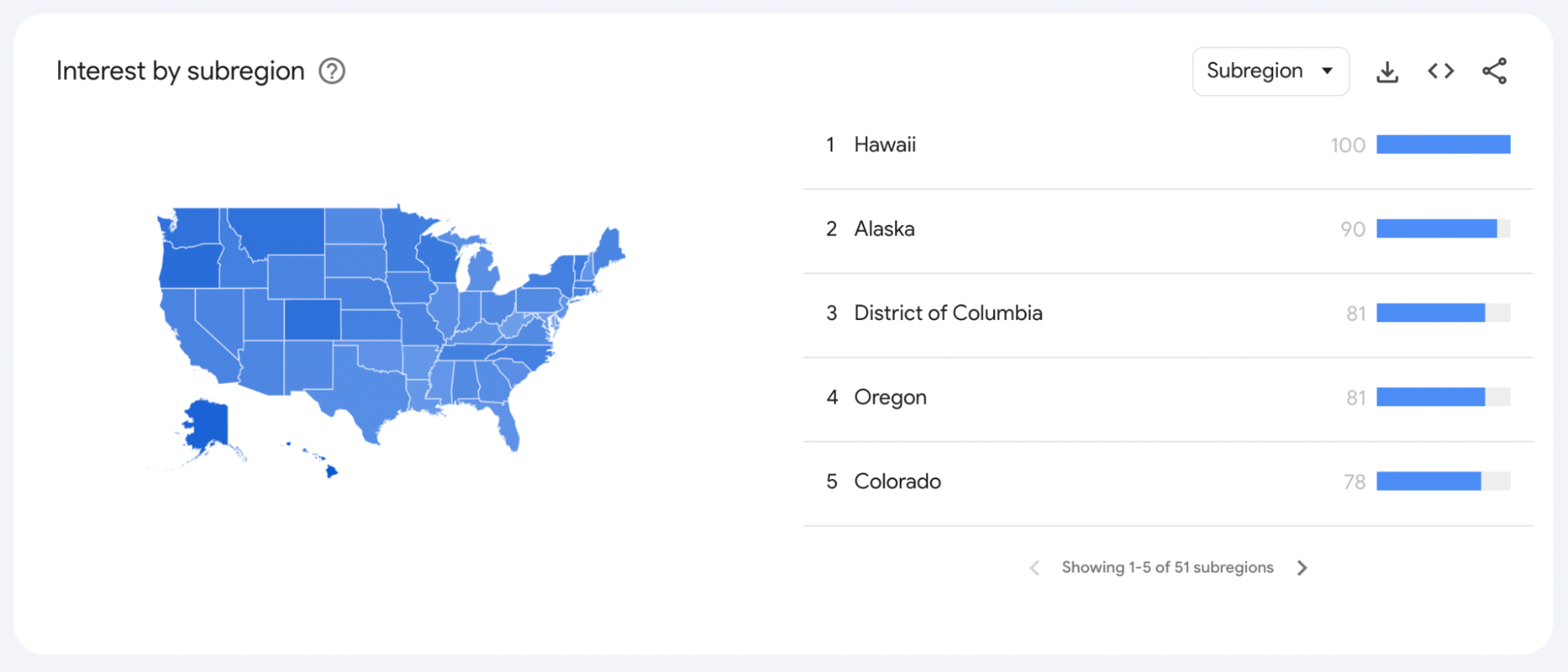
Look for shopping-specific phrases
You can filter Google Trend results by type, including Google Shopping—a subset of Google’s main search engine that only displays product listings from ecommerce sites.
Say you sell hiking equipment. Run a search in Google Trends for the general term “hiking” and filter your results by looking specifically for people who searched in Google Shopping. It’ll narrow down searches with buying intent.
Compare topics to see what’s popular
Google Trends’ Compare feature allows you to benchmark several search terms against each other. It’s a useful tool if you’re planning to sell products in several locations or to different audiences.
Say you want to create a content marketing strategy for your retail business that sells pet supplies. You want to attract more cat owners to your website, so you start a blog and create helpful cat content. But what should you write about? Google Trends allows you to know (rather than guess) since you can compare terms as a way to do keyword research:
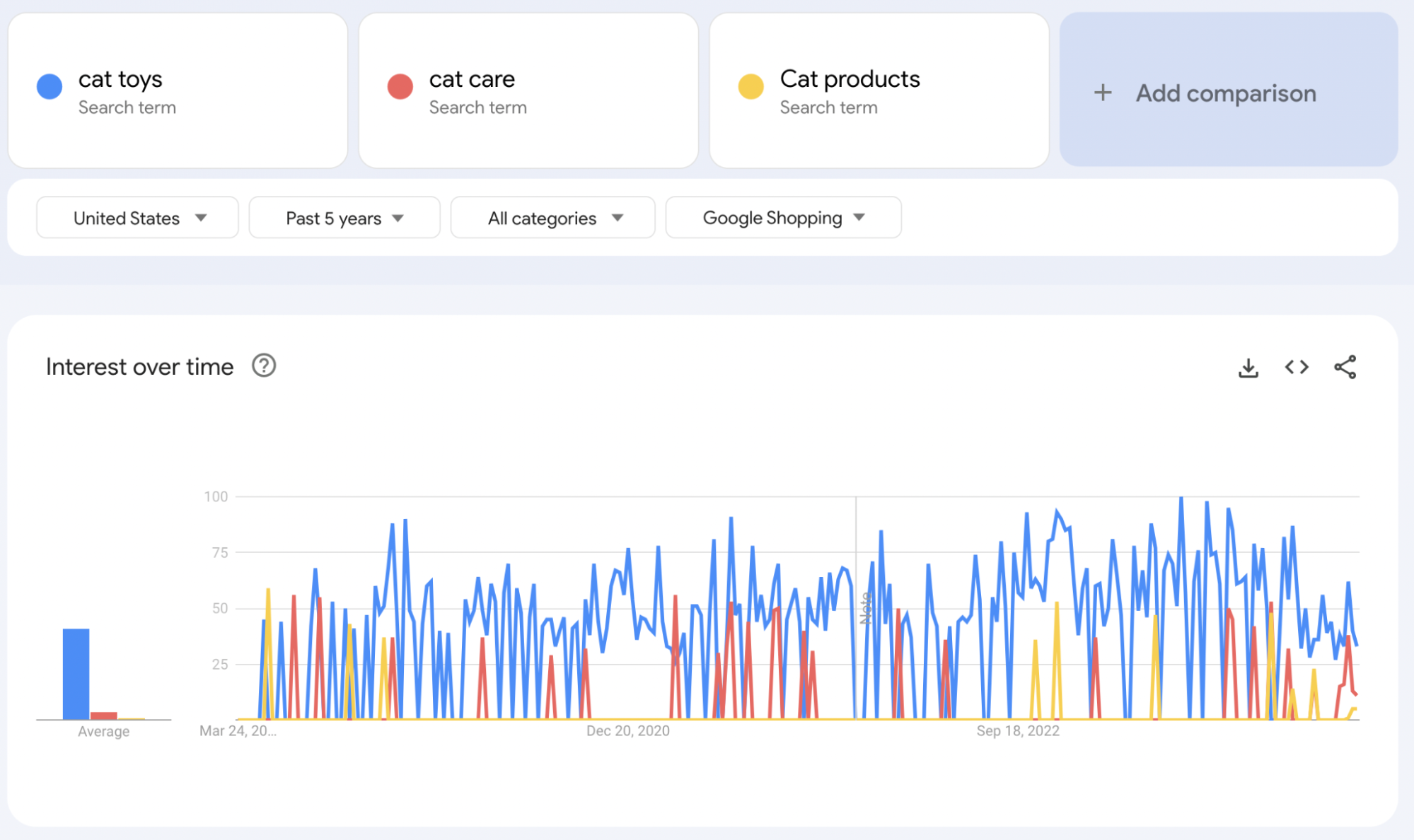
While it’s close, “cat toys” is consistently the more popular search term. You can use this to inform your content strategy and optimize your site—as well as your store’s products—for specific toys.
Explore rising and breakout terms
Google Trends provides past keyword data, hinting at future trends through the trajectory and especially through Rising and Breakout terms. Use the Rising filter in Related Queries or Topics to spot terms gaining momentum. Keep in mind that Breakout labels signal a search increase over 5,000%, highlighting emerging trends.
How to validate Google Trends research
Google Trends data is a good indicator of search habits, but not all trending topics are products that people buy. Validate your product idea by comparing data from several marketplaces before spending thousands of dollars on product development.
Say you’re selling handmade jewelry. Google Trends data indicates that searches for “gold hoop earrings” are gradually increasing after an initial spike in 2023:
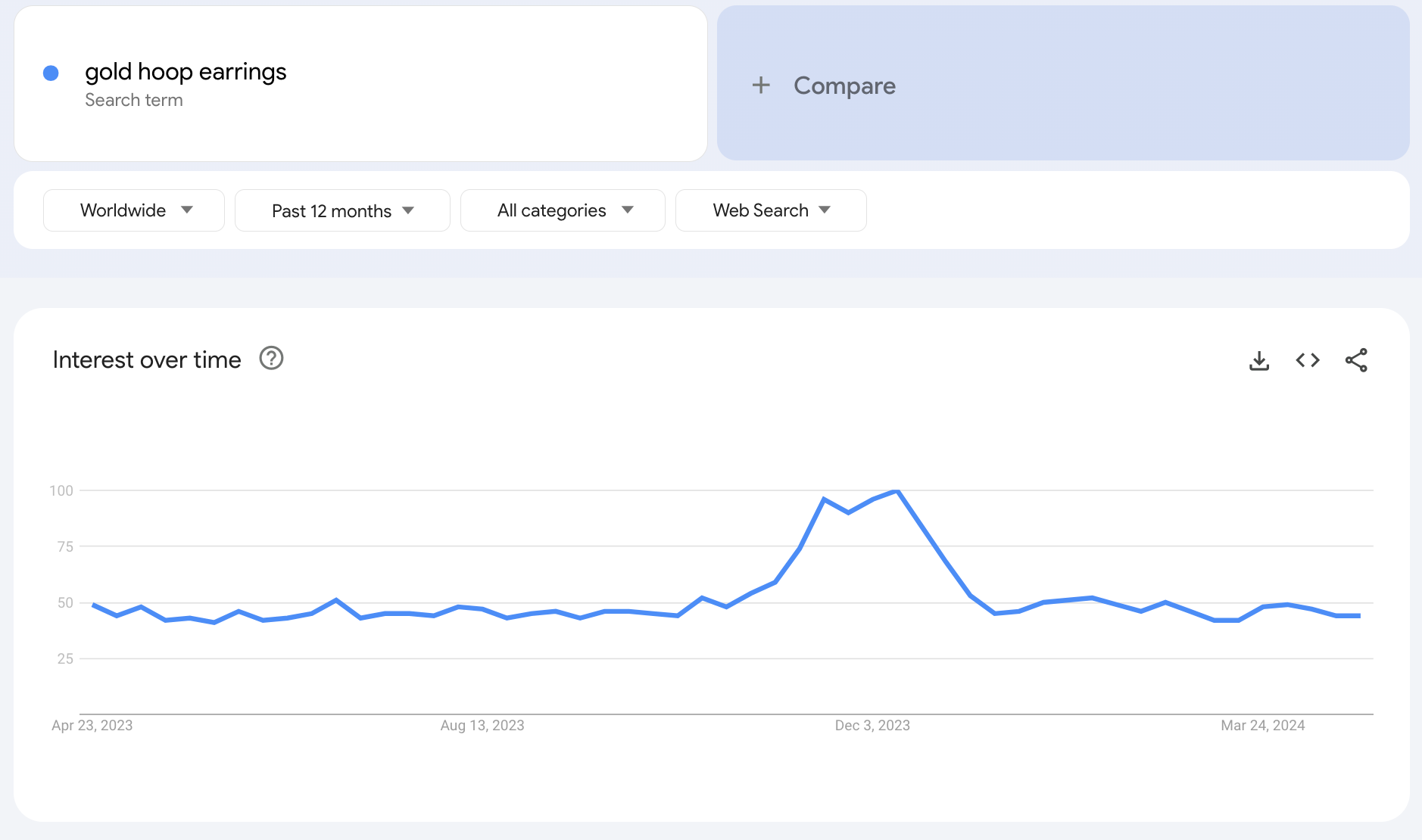
When searching for the same phrase on Etsy, this product appears with a “popular now” tag, indicating that gold hoop earrings are worth considering if you’re an online store looking to sell trending products like gold jewelry:

Alongside listings on platforms like Amazon, Etsy, or eBay to gauge demand, pricing strategies, and customer reviews on similar products, you could validate Google Trends products by:
- Analyzing social media trends. Social platforms are great for catching early waves of interest. Platforms like TikTok or Pinterest help you add context to if a Google Trends product aligns with emerging consumer behaviors.
- Looking for competitors selling the same product. Something as simple as observing how many competitors are offering the product can indicate market saturation or opportunities for differentiation.
- Surveying your target audience. Feedback from potential customers validates whether the interest shown in Google Trends translates into actual buying intent. It’s one of the best ways to validate whether your product idea will sell.
Find great products to sell on Google Trends
Google Trends is a valuable tool for finding trending products for your retail store.Use the data as a starting point for your research. Validate your ideas with customer feedback and marketplace comparisons. It’s the best way to ensure that the products on your shortlist actually sell.
Need a helping hand? Shopify POS collates data from every sales channel and displays it in easily digestible reports. Find your best selling products by location, identify seasonal trends, and monitor team performance—all from a single dashboard.
Read more
- 10 Things to Consider When Scouting Space for Your Brick-and-Mortar Store
- 5 Successful Retail Businesses That Started Off as Side Hustles
- How To Work With a Developer to Build Your Retail Website
- 5+ Ways to Build Your Side Business Without Quitting Your Day Job
- How This Gemstone Retailer Is Making Sales Magic With Healing Crystals
- How To Make Your Retail Store Attractive To Business Investors
- 7 Ways to Generate Revenue Before You Open Your Retail Store
- Retail Franchising 101: How to Take Advantage of Franchise Opportunities





